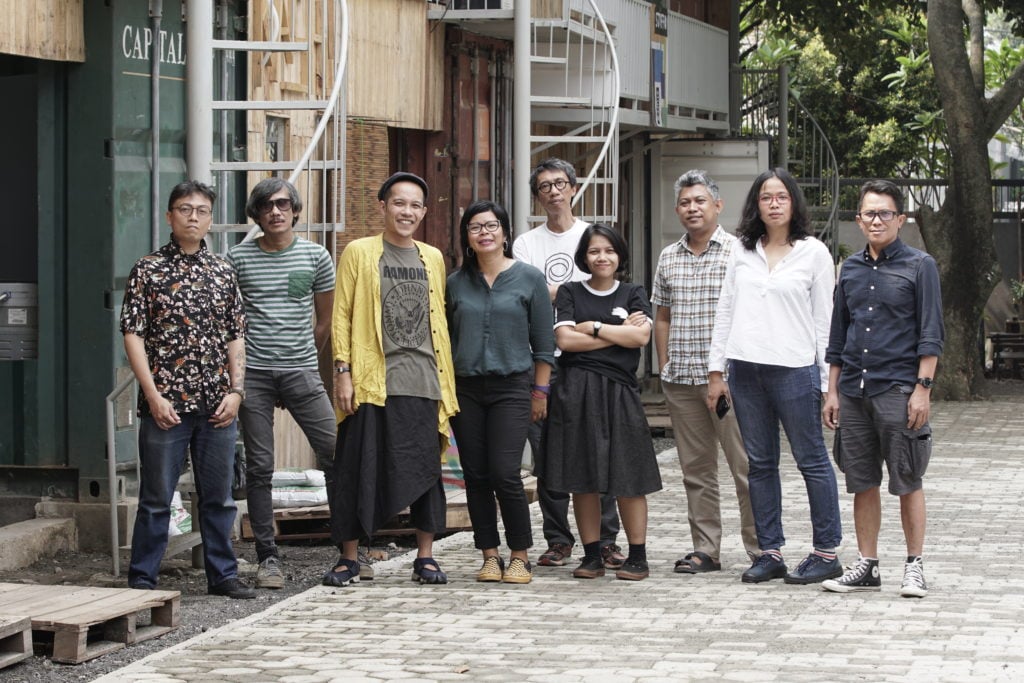People
‘Community-Based’ Indonesian Collective ruangrupa Will Be the Artistic Director of documenta 15
documenta says it is consciously giving room to a non-European view of the art world.

documenta says it is consciously giving room to a non-European view of the art world.

Kate Brown

An Indonesian artist collective has been tapped to direct the 2022 edition of documenta, the prestigious quinquennial exhibition in Kassel that was recently mired in controversy over its budget.
The Jakarta-based group ruangrupa was chosen from a list of 10 candidates by an anonymous vote of the exhibition’s committee. Each contender was invited to develop a concept for the show, which is regarded as one of the most influential exhibitions in the world. The group is the first artistic collective and only the second non-European or American to take on the role.
“We have appointed ruangrupa because they have demonstrated the ability to appeal to various communities, including groups that go beyond pure art audiences, and to promote local commitment and participation,” Belgian curator Philippe Pirotte, a representative of documenta 15’s search committee, said in a statement. The group’s “curatorial approach is based on an international network of local community-based art organizations. At a time when innovative strength particularly stems from independent organizations active on the community level, it seems only logical to offer this collective approach a platform with documenta.”
Ruangrupa, which is loosely translated from Indonesian as “a space for art,” was founded in Jakarta in 2000. The 10-person collective participated in documenta 14 as a contributor to its internet radio station. The collective also recently took part in the 2018 Gwangju Biennale and curated the international exhibition Sonsbeek in 2016 in the Netherlands. The group’s founding member, the artist and curator Ade Darmawan, is also credited with reinventing the Jakarta Biennial and raising its international profile.
“We want to create a globally oriented, cooperative, interdisciplinary art and culture platform that will have an impact beyond the 100 days of documenta 15,” the collective said in a statement. Referencing the origins of documenta, which was founded after World War II, the group added, “If documenta was launched in 1955 to heal war wounds, why shouldn’t we focus documenta 15 on today’s injuries, especially ones rooted in colonialism, capitalism, or patriarchal structures, and contrast them with partnership-based models that enable people to have a different view of the world?”
The previous edition of documenta took place in both Kassel and Athens under the leadership of Polish art critic and curator Adam Szymczyk. But he came under fire for going over budget.
“The last half year was a difficult time,” Kassel’s mayor Christian Geselle acknowledged at the press conference today. The city of Kassel and the state of Hesse had to provide €8 million ($9.5 million) in emergency loan guarantees at the last minute to the beleaguered exhibition. A few months after documenta 14 closed, an independent audit revealed that the deficit was caused by overspending at documenta’s secondary venue in Athens.
The seasoned German art foundation director Sabine Schormann succeeded Annette Kulenkampff last fall, after she agreed to step down from her post a year before her contract expired. Under her leadership, documenta 14 racked up a deficit of €5.4 million ($6.3 million).
The quinquennial exhibition was initially founded in 1955 to show “degenerate” art that had been censored by the National Socialists and it has maintained an important political mandate since. The next edition is due to take place from June 18 to September 25, 2022.
Hessian Minister of Higher Education, Research and the Arts, Angela Dorn, said the decision to pick the Asian collective was informed by the need for social debate. “With the selection, documenta is consciously giving room to the non-European view of the art world and bringing the world to Hesse in a completely new way,” she said.